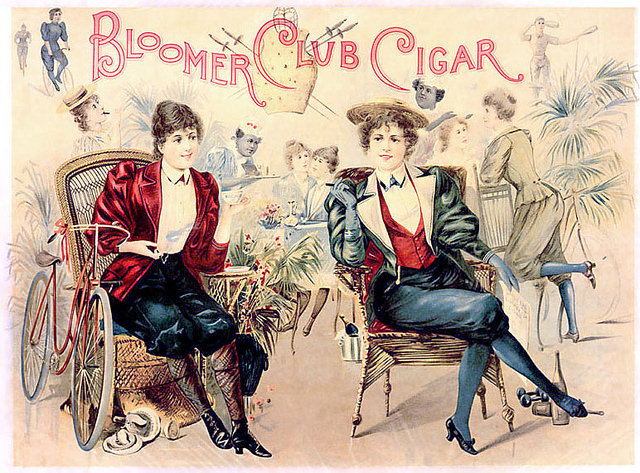It’s Bowdler’s Day, which, while not exactly a day to celebrate (it’s the birthday of Thomas Bowdler, an English physician best known for publishing a censored edition of Shakespeare), does give us an excuse to write about eponyms like bowdlerize, or to remove or change parts of a text considered offensive or vulgar. Here are 10 more common words you might not know come from the names of people.
boycott
“He [sc. Mr Savelle] advised the people to ‘Boycott’ any man who betrayed them by taking such land.”
Glasgow Herald, November 1, 1880
Long before it was Twitter hashtag and call to action, boycott was the name of one Charles C. Boycott, an English land agent in Ireland. According to the Online Etymology Dictionary, Boycott refused to lower the rent for his tenant farmers, resulting in ostracism by the Irish Land League – as well as the prompt adoption of his name to mean to abstain from using, buying, or dealing with as a form of protest.
bloomer
“The Bee says the daughter of Dr. Hanson, of this city, appeared in the Bloomer suit … last week.”
Boston Evening Transcript, May 27, 1851
Perhaps you thought these old-timey women’s trousers were named for the way they seem to bloom from waist to knee, but they were actually in honor of women’s rights advocate Amelia Bloomer, who promoted and wore them herself instead of the long skirts and confining corsets of the time.
sideburns
“Norris and Warner want to be fashionable. They are cultivating side-burns.”
Indianapolis People, April 8, 1876
Hipsters everywhere can thank Civil War Union general A.E. Burnside for this facial hair fad. Burnside refers specifically to a style of beard with a mustache, whiskers on the cheeks, and a clean-shaven chin. Sideburn, just the hair from temple down, is an alteration of the burnside and perhaps influenced by side-whisker.
leotard
“Leotards … are used by acrobats and aerial performers.”
J.W. Mansfield, Letter, January 1920
French acrobat and aerialist Jules Léotard gave us a lot. He developed the art of trapeze and inspired the song, “The Daring Young Man on the Flying Trapeze.” He also popularized and gave his name to the stretchy one-piece garment favored by dancers, gymnasts, and aerobics enthusiasts.
nicotine
“Of nicotin. This substance exists in the leaves of the nicotiana latifolia, or tobacco, and gives that plant its peculiar properties.”
Thomas Thomson, A System of Chemistry, In Four Volumes, 1817
This “colorless, poisonous alkaloid” is “used as an insecticide.” It’s also the addictive substance in tobacco. Jean Nicot was a 16th-century French ambassador and lexicographer, according to the Oxford English Dictionary (OED). When he returned from Portugal, he brought back tobacco, which was an instant hit in the royal court.
The word nicotian, named after Nicot, first referred to the tobacco plant itself. By the early 19th century, nicotine referred to the substance in tobacco.
mesmerize
“Carr would almost have forgotten her existence, had it not been for those eyes which mesmerised him every now and then, in spite of himself.”
Hamilton Aïdé, Carr of Carrlyon, 1862
You might be mesmerized to know the word mesmerize comes from the name of an Austrian physician. Friedrich Anton Mesmer was a proponent of mesmerism, a kind of hypnotism that involves animal magnetism, a special power one holds over others. Later, the term came to mean magnetic charm or sex appeal in general.
maverick
“We … will crush radicals, greenbackers and all other foes of democracy, especially those independent gentlemen, those political mavericks.”
The Galveston Daily News, August 19, 1884
If you’re a maverick, you might be a dissenter or independent thinker. Or you might be an unbranded calf. Either way you might also be named for Samuel A. Maverick, a Texas lawyer who refused to brand his cattle.
shrapnel
“He was wounded on the mouth and ankle by a piece of shrapnel.”
Highland Light Infantry Chronicle, October 1914
The word shrapnel is named for General Henry Shrapnel, a British army officer who “invented a type of exploding, fragmenting shell” consisting of “a hollow cannon ball, filled with shot, which burst in mid-air.” The general’s less catchy moniker for his invention was “spherical case ammunition.”
dunce
“But now in our age it is growne to be a common prouerbe in derision, to call such a person as is senselesse or without learning a Duns, which is as much as a foole.”
Francis Thynne, Holinshed’s Chronicles, 1587
The word dunce hasn’t always meant, well, dunce. Named for Scottish scholastic theologian John Duns Scotus, it first referred to a follower of Duns’s teachings, says the OED. Then it gained the derisive meaning of “a hair-splitting reasoner,” due to later philosophers who ridiculed his work, as well as “a dull pedant” and finally someone dull-witted.
Dunce cap might have first been used by Charles Dickens in his novel, The Old Curiosity Shop: “Displayed on hooks upon the wall in all their terrors, were the cane and ruler; and near them, on a small shelf of its own, the dunce’s cap, made of old newspapers and decorated with glaring wafers of the largest size.”
guppy
“The following are live-bearing tropicals: … Guppy (Lebistes reticulatus). Males small and brilliantly colored.”
Aquatic Life, November 1925
This small, brightly-colored fish is named for Robert John Lechmere Guppy, the British-born naturalist “who sent the first recorded specimen to the British Museum,” according to the OED.
Of course this is all just the tip of the eponymic iceberg. Check out this list for a lot more common words derived from names, as well as toponyms (words from place names) and genericized trademarks.
What are some of your favorite eponyms?
